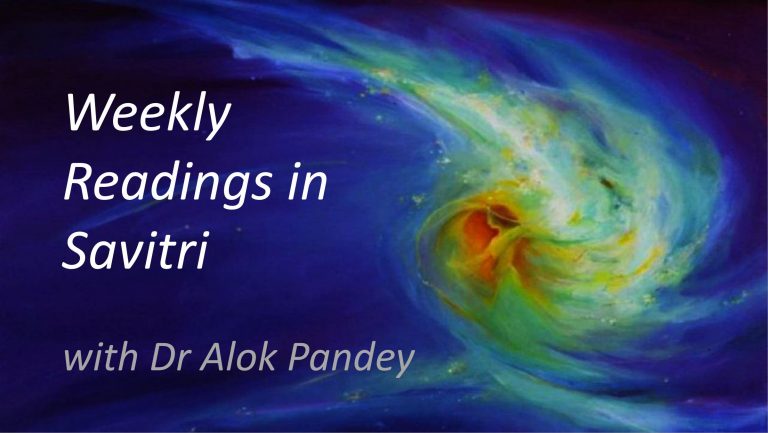This Canto deals with the slow and painful emergence of life involved in matter.
At the Feet of The Mother
Canto IV: The Kingdoms of the Little Life
The first stir of mind is used by life for its own purposes. Later the mind will free itself and life also grow to look beyond our animal birth and present state of ignorance tied to the outward and the immediate.
This is the brief ephemeral existence of a dwarf humanity, a primitive life that lives only by and for the sake of flesh, not seeking for the soul within.
The mind is a limited and limiting Intelligence. It can see things only in firm and fixed boundaries and distinct and separate from each other. This is the first step in the unfolding of various aspects and powers and possibilities of the mind.
Step by step Sri Aurobindo is leading us through the evolutionary process, first of life in matter than of mind in life.
We find here a most remarkable description of the early birth of mind in the animal kind. This description is not only consistent with the deeper spiritual truths but also with the current biological understanding of the evolution of life upon earth.
We see a slow progression in the animal world, creation moving slowly through millenniums for one small step. It is a crude start and yet one that prepares for the next evolutionary step.
What follows is a remarkable passage that reveals an early prototype of primitive humanity that yet may linger in us, raw and unregenerate. It is a humanity driven by the herd instinct. Tribe and clan is all they know and the bodily self is for them only true reality.
In early humanity, the soul was just a little spark buried deep within dense rings of Matter. Such a humanity was more like the titans whose memory is preserved through myths and legends. These intermediary species paved the way for the coming of modern man that is a little farther than an animal even though its body is still of an animal make.
Sri Aurobindo describes this primitive humanity that still continues to exist and yet goes unrecognised since it has learnt to hide itself in the garb of dress and a group behaviours that only ensure and strengthen its survival rather than any deeper search.
Sri Aurobindo draws here a parallel between the animal life and the life of primitive humanity that is driven largely by animal impulses. It is a life driven by external stimulus and instinctive impulse. Self-reflection, self-knowledge, self-awareness are not yet there.
After the prolonged early experiments with simple living forms, Nature started creating or rather evolving more and more complex forms. These animal forms had not only matter and life but also an early rudimentary mind that was at the service of the impulse to live.
There is a purpose in this slow and random start. There is a reason why the soul is perennially tied to creation and its fate. It is not an accident but a choice, not a purposeless game but a conscious Will that has gone into creation.
Thus we are revealed the difficulty and the danger and yet the inevitability of evolution and the Wisdom that uses all, even our resistance, for a greater perfection.
Life emerges with difficulty in matter. Its evolution has been led by desire which is a construct of ignorance. This must change into a conscious aspiration for the True and the Eternal, for then only can life find the infinite Bliss that it is really seeking for.
The Divine is everywhere and in all things. The appearances of life often deceive us and the meanest elements carries within its core the deep possibility and presence of Light and Love and Hope and Joy.
This small, seemingly insignificant world of early life forms holds a purpose of God. It is the first step that matter takes towards a much greater climb that is its inevitable destiny. God is the secret Truth that Nature hides behind every form.
Sri Aurobindo reveals to us vividly the early beginnings of life, the birth or rather the evolution of sense contacts, instincts, the seemingly unconscious will to live and survive in a beautiful, enigmatic, dangerous world.

